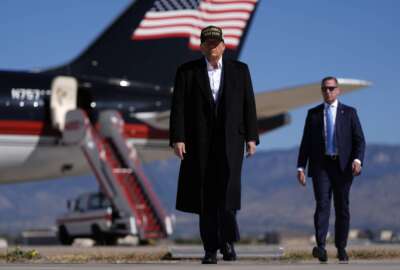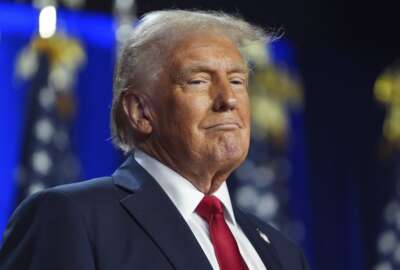Trump still forgoing ‘critical’ agreements for transition planning
Officials on President-elect Donald Trump’s transition team said this year’s transition planning efforts will be “about as different as possible” from 2...
Worried about Schedule F and the future of your job? Excited to see if DOGE can improve government efficiency? Want to know more about the proposed pick to head up your department? Federal News Network is tracking all things transition-related, as the 47th administration’s plans for the federal workforce take shape. Visit our Tracking the Transition page to keep up with the latest developments.
President-elect Donald Trump’s transition planning team is taking an approach unlike any prior incoming administration — including Trump’s own transition into his first term in 2016.
Trump officials have not signed the standard memorandums of understanding with key federal entities to get presidential transition planning underway. Transition officials said they are opting to use private donations to finance their work rather than accepting congressionally appropriated funds.
For the incoming Trump administration, there are about 20 officials currently working on the transition team, including Robert Kennedy Jr. and former congresswoman Tulsi Gabbard, as well as transition co-chairpersons Linda McMahon and Howard Lutnick.
Lutnick said this year’s transition efforts will be “about as different as possible” from 2016.
In 2016, Trump’s campaign team had set up its transition operations by the spring of the election year, which was “the right time to start,” said Max Stier, president and CEO of the Partnership for Public Service. Still, the incoming administration, at the time, “made different mistakes.”
“They had a sophisticated and thoughtful process, run by then-Governor Chris Christie. But two days after the election, that then was pushed aside — not just with the firing of Governor Christie, but also really kicking aside the work product that the larger team created,” Stier told reporters Friday. “That was not a good process, but they still had entered into all those MOUs. They still had agreements with the General Services Administration, with the White House, with the Department of Justice. They did all these things that we believe are really vital to be ready.”
Typically, there are three agreements that go into place between a transition team and federal agencies. An agreement with GSA outlines support services such as access to office space, IT equipment and federal staff. An agreement with the White House defines how an incoming administration can access agencies after the election. And an agreement with DOJ covers security clearance requests for transition team members who need to access classified information.
The three MOUs are relatively short and “straightforward,” said Valerie Smith Boyd, director of the Partnership’s Center for Presidential Transition. They involve signing pledges committing to handling federal information responsibly, and agreements for obtaining security clearances.
“If the Trump team were to submit the names of its transition team members to GSA and sign the White House MOU, then they could begin receiving briefings from federal agencies very quickly,” Smith Boyd said.
What has changed since 2016?
In the years since Trump’s first transition into office, there have been a few changes to the requirements in the transition planning agreements. In 2019, Congress updated the Presidential Transition Act, setting more concrete deadlines for some transition activities and codifying GSA’s role as the official transition coordinator.
Additionally, the 2019 changes required presidential candidates to create and publish ethics plans prior to the election. The plans are supposed to detail how transition teams will comply with — and how presidential candidates will address — their own conflicts of interest while in office. The document has to detail the roles of lobbyists and foreign agents, as well as plans for protecting classified information, limiting private contributions, and agreeing not to use agency information for private gain.
“You could speculate as to why that might be something that would be difficult for the Trump team,” Stier said. “But I think fundamentally what is critical to understand is that while transition planning is private activity, it is deeply connected to the activity of our government and ultimately to the stewardship of public resources. One of the core purposes of the structures that have been put in place is to try to ensure that there’s both the avoidance of conflicts of interest, and the appearance of conflicts of interest.”
The ethics disclosures and financial contributions are factors in the Trump team’s hesitancy to sign the agreements, the Associated Press reported last week.
A 2022 law also made reforms to the process of “ascertainment” by requiring an equitable release of GSA transition services to both candidates, in the case there’s not a clear winner immediately after the election.
Without the key MOUs in place, Stier warned there will be “severe” consequences for national security and government operations.
“They have, up until now, walked past all of the traditional — and we believe vital — agreements with the federal government,” Stier said. “These are, in our view, critical elements to being actually prepared to govern on day one.”
Former transition officials have also raised concerns about cybersecurity in the absence of transition planning agreements for the incoming team. One former official said it would be difficult for Trump’s team to stand up the same level of cybersecurity protections on its own as it could with the support of the current administration.
Next steps for Trump’s transition
The Presidential Transition Act requires MOUs to be in place before the work can begin for transitioning from one administration to the next. White House and GSA officials have both said they’re standing at the ready to offer resources to Trump’s team to work on transition planning.
“GSA is prepared to work with President-elect Trump’s transition team to complete the required agreement to receive GSA administrative services and support,” an agency spokesperson said in a statement.
Trump transition spokesperson Brian Hughes told Federal News Network last week that “transition lawyers continue to constructively engage with the Biden-Harris administration lawyers regarding all agreements contemplated by the Presidential Transition Act.”
“We will update you once a decision is made,” Hughes said.
The Trump transition team did not respond to Federal News Network’s request for comment Monday asking for any updates to transition planning efforts.
Smith Boyd said all the standard transition services “would help the Trump team have its people ready to hit the ground running to arrive in office on Inauguration Day.”
Copyright © 2024 Federal News Network. All rights reserved. This website is not intended for users located within the European Economic Area.
Drew Friedman is a workforce, pay and benefits reporter for Federal News Network.
Follow @dfriedmanWFED






